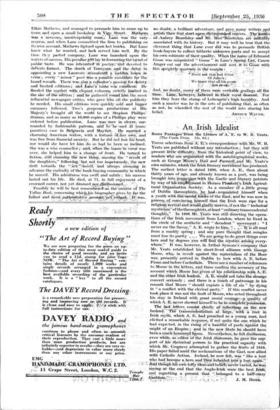An Trish Idealist
mystiottin" of thetheosoghists, at least " ordinary transcendental, thoughts," In 1896, Mr.ICits was still directing the opera- tions of the Irish movement from London, where he lived in the circle of the aesthetic and " decadent " movement : " I never see the Savoy," A. E. vvrgte-to 2 1fis all mud from a muddy spring ; and any pure hrinight that -mingles must lose its purity We are go_ iox- to here and by degrees you find the inYsticS arising every- where." It was, howeVer, in Arthui Syrhons'i-cOni- that Mr. Yeats established his short-lived alliance _ with :.George Moore, whq, in revolt. against the materialism of, the Boer war, presently arrived in Dublin to bow with A. E, before Fionn and before Cuchullain. There are a riuMber of references to Moore-in thg letters; and these -confirmthe accuracy of the account which Moore has given of his i-eltitionship with A. E. and the &hell Irish leaderk- A. E. would not take-the strange convert seriously ; and there is a touch of patronage in his remark that Moore " should expiate a life of sin " by dying in " a conflict with the clerical party." If this conflict never took place it was not the fault of Moore, who acted throughout his stay in Ireland with great moral courage-'-,-a duality of which A. E. never showed himself to be in cOnipieteliossession. The last letters consist chiefly Rf. -toectiolis on the new Ireiand.- transeendenfalism at with a '1.6ot iri Irish myth, which A.E. had preached as a young man, had elicited a remarkable response, if not quite the one, which he had expected, in the rislUg of `a handful of poets -against thg might of an Empire,; and in the new Stay he _should have been a much honoured figure. Nevertheless, lie felt even while, as editor of the Irish Blakeman, he gaye the sup-- port of his' rhetorical powers to the practical; sagacity with which Mr. Cosgrave attempted to gather the fruits of 1916. His paper failed amid the acclamations of the Gael, now allied, with Catholic Action. Ireland, he now felt, was " like a lout THESE selections carrespendence",with:Mr.; W. B. She was a wise counsellor ;--.'arids :the boonAri Verse was Yeats are published without any introduction ; but they will present- little' difficulty, 'froth the historical _point of view, to fiction, still chOesing thing, niusing.,the "revolt of readers-Who are airiniiiitid with the autobiographical works, such George 'Ware's: Hail and _rirvereg46,and Mi. Yeats's min memoirs, whiehihe friibliterary moVeinenf has Produced. The earliest letter is dated 1896, when A. E., then about thirty years of age, and already known as a poet, was being brought int--konwlinrg.-iiith the Gaelic and literary patriots by way of ineeniAfrnmt in liOraeo Plukiketp Agricul- tural Organisation Society: As a Member of a klitfle group of Dublin theosophists, he IkAolacquainted ;himself when a youth witli-thesagrird li(iolc:Shf the East, and he was now in = "' convincing- himself that the Irish were .ripe for a reliflwiAt ieyiv,g1 and:weidd gladly receive, if not the " technical (The Cuala Press. 12s. 6d.) , who had beware a hero, and Tfieri gultriided;inte-it lout agiiiii."5 -: 11AIMIebFARAIWYPtION EI. LTD. ' kid thiingh Ins own lofty ideas beliefs-never varied; hetwas , _ k. • _ , , .v!, - saying at the end that the Anglo-Irish were the best Irish; i-kk. 11 Grape Street, London, W.C. 2. Temple and regretting a present that ".belonged to a half-crazy


















































 Previous page
Previous page